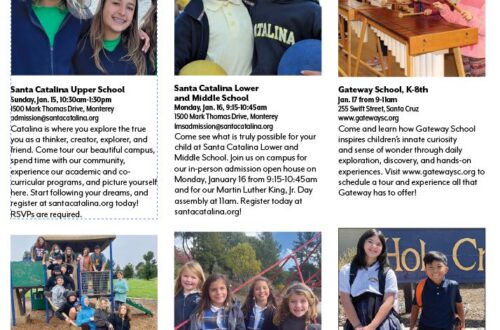At Cabrillo, Special Needs Become Assets
By Suki Wessling

When students identified with a learning difference in their K-12 program register at Cabrillo, one of their first stops is the Accessibility Support Center run by Beth McKinnon. In this interview, McKinnon explains the ASC’s purpose, how students are identified, and how ASC support helps student succeed at Cabrillo and beyond.
What is the mission of the Accessibility Support Center?
Our purpose on every college campus is to serve students with disabilities. We are here to make sure that there is equal access and what we call equity for students who have any kind of disability—everything from physical and visible disabilities to invisible disabilities such as ADHD, high-functioning autism, the autism spectrum (ASD), head injury…
What sorts of services and support are offered by the Accessibility Support Center?
Students with verified disabilities are met one-on-one—it’s a case-by-case accommodation. The most common accommodations are extra time on tests and either electronic or classmate notetaker in classrooms. Some students need alternative media such as having their book converted from visual to audio. Each student is seen as an individual and their needs are tailored given that class.
Which students tend to seek out services?
We have almost 1700 students in this program, so at least 15% of the college population comes here for services with verified disability. Most of them have been identified in school before, but a lot of them get identified with an “invisible disability.” They weren’t served in K-12 and they developed enough strategies to squeak through.
Are there underserved populations that you’d like to reach?
We have a lot of instructor referrals. They see a student who is working hard but is bombing tests or has poor writing skills. Sometimes other students who know them say, “you might just want to go get an assessment.” They go through a screening process to see if they should be tested. [We identify more students] largely because we have different criteria than the K-12 system does. I think, too, the K-12 system doesn’t have the capacity for learning disabilities specialists. They’ve got their school psychologist, but the job is overwhelming at that level. Our public education system is not funded well enough to provide the kind of support we’d like to see. I work closely with our area high schools with the special ed and resource teachers, and the transition specialists who are working with students with IEPs.
How does Cabrillo staff assist the ASC?
We do a lot of professional development for our faculty and staff to identify students. When students struggle, there may be something that is in the way of accessing their education successfully. Our faculty are recognizing that maybe there is a reason for this. This person isn’t just sloppy or bombing the test when they seem to be able to do their homework.
Does the ASC support high school students attending Cabrillo concurrently?
We do. We don’t typically test like we do for college students. If a student needs to be tested for an LD, that needs to be done in their district. But we do provide accommodations for students, particularly for students who are coming in with 504s or IEPs.
Do students with special needs go on to 4-year universities?
We don’t say “special needs” for all of our students. Students with learning differences are as intelligent as students without, sometimes more intelligent. They simply have processing problems or fluid reasoning problems. Something gets in the way of their being able to process and manage information. With accommodations they are able to access the same level of academic success. These are not “special needs.” They are students who are successful, intelligent, and capable. They just need to be taught accommodations to develop their abilities.
We also have post-secondary students who have intellectual disability and aren’t necessarily in academic classes—they are taking adaptive classes. We work with the County Board of Education who help manage this program.
More and more students in the K-12 system who are identified young as having “special needs” and put into special programs are being mainstreamed. We’re seeing more mainstreaming of ASD students. More of those students are accessing college and succeeding and transferring. We still have a long way to go to not stigmatize people.
What message would you like to give to students who worry that they won’t be able to handle college because of their disability?
The time was when people in wheelchairs could not get around on the streets by themselves because we didn’t have curb cuts. Suddenly access was there, not only for people in wheelchairs. This is the kind of thing we’re seeing in education. I have students graduating this fall that I’m just popping my buttons over because they are students with autism. They have been at the college for 5 or 6 years and they are graduating and transferring to 4-year colleges. When they arrived, no one could see it. It used to be that instructors would call me and say, “This person doesn’t belong in college. Why would you think this is a good idea?” I would say, “It is a good idea!”
The more people are exposed to disabilities of all kinds, the more normalizing it is. Students don’t feel the stigma, they come in and say, “Hey, I know what I need.” They are learning how to advocate for themselves.
We don’t refer to ourselves as a disability center. We think of ourselves as a learning resource for any kind of student who needs to access resources on campus and in life to be successful. We happen to serve a population of students who have verification of need.
Resources:
Visit the ASC at http://www.cabrillo.edu/services/dsps/. The Disability Awareness Links page offers a wider view of disabilities in our society.
Suki Wessling is a local writer and the mother of two teens. She teaches online classes for children and adults at Athena’s Advanced Academy. Visit SukiWessling.com for more information and links to her blogs.








One Comment
Bethany Kientzel
Wonderful article! I feel so hopeful moving forward with my son’s education. And now I know where to begin at Cabrillo.